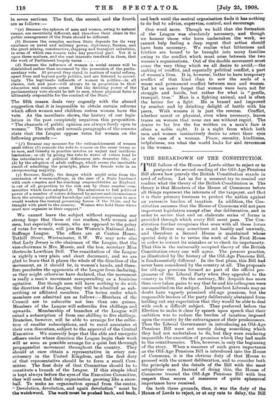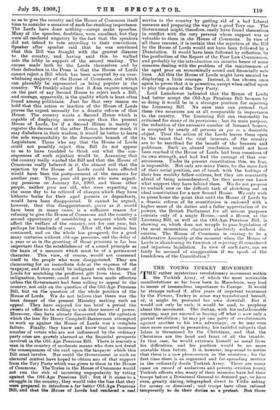THE BREAKDOWN OF THE CONSTITUTION.
THE failure of the House of Lords either to reject or to postpone the second reading of the Old-Age Petitions Bill shows how gravely the British Constitutioe stands hi need of reform. Let us for a moment try to remind our readers what the theory of the British Constitution is. The theory is that Members of the House of Commons before all things represent the interests of the taxpayer, and that it is their primary business to protect the ttatititi against an excessive burden of taxation. In addition, the Con- stitution assumes that the House of Commons will not pass important legislation except after due deliberation, and in order to secure that end an elaborate series of forms is provided through which every Bill must pass. The Con- stitution further recognises that even with all these forms a single House may sometimes not hastily and unwisely, and therefore a Second Rouse is maintained whose special duty it is to revise the work of the First House in order to correct its mistakes or to check its impetuosity. That this is the universally accepted theory of the British Constitution every one will agree. The present practice, as illustrated by the history of the Old-Age Pensions Bill, is fundamentally different. In the first place, this Bill had never been considered by the country at all.Thelptoposals. for old-age pensions formed no part of the official pro- gramme of the Liberal Party when they appealed to the- country in 1906. On the contrary, Mr. Asquith has mere than once takeh pains to say that he and his colleagues were uncommitted on the subject. Independent Liberals may no doubt have vaguely promised old-age pensions, but the responsible leaders of the party deliberately abstained from holding out any expectation that they would be able to deal with such a difficult subject. They preferred before the Election to make it clear by speech upon speech that their ambition was to reduce the burden of taxation imposed. upon the country by the extravagance of their predecessors> Thus the Liberal Government in introducing an Old-Age Pensions Rill were not merely doing something which they had not Undertaken to do, but they were rendering impossible the execution of promises which they had made to the cdestituencies. This, however, is only the beginning of the Story. When a measure of such grave importance as the Old-Age Pensions Bill is introduced into the House of Commons, it is the obvious duty of that House to proceed with the utmost deliberation, and to consider both the principle and the details of the Bill with the most scitetilout care. Instead of doing this, the Rouse of Commons treated the Old-Ago Pensions Bill with less respect than scores of measures of quite ephemeral importance have received.
On both these grounds, then, it was the duty of the House of lierds to reject or at any rate to delay, the Bill so as to give the country and the House of commons itself time to consider a measure of such far-reathing importance. The lords have done nothing—except make Speeches. Many of the Speeches, doubtless, Were excellent, but they were all rendered nugatory by the fact that the speakers did not intend to Vote lead-dine to their convictions. Speaket after speaker said that he was convinced that this Bill was fraught with the gravest disaster to the 0..OUntry, and having said this he walked into the lobby in support of the attoond reading. The excuse Made both by the Lords themselves and by their defenders in the Press is that the House of Lords canna reject a Bill which has been accepted by an over- whelming majority of the Rouse of Commons, and which can plausibly be reptesented as being popular in the country. We frankly admit that it does require courage on the part of any Second Houge to reject such a till, and courage, apparently, is the gtialitif Which is least often fciund among politicians. /list for that very reason we held that this action or inaction of the House of Lords proves the urgent necessity for a dratitic /*form of that House. The Country wants a Second HO Ilse Which is capable of displaying Mere courage than the present Reuse of Lords, for if a, Second House is merely to register the decrees of the other }louse, hodgeter Much it uta,y disbelieve in their wisdom, it would be better to leave the Side responsibility to the democratic, branch of the Legislature. Those Who say that the Routie of Lords &Mid not possibly rejeet this Bill de not appear tO Us to have troubled to think out what the con- sequences of such rejection Would be. Assuming that the country really Wanted the Bill and that the House of Commons really believed iti it, the utmost evil that the rejection by the House of tordti could have effected Would have been the postponement of the measure for another year. Those peer old people Who were expect- ing :pensions on Sanitary 1st, 1909, and those other people, neither poor nor old, Who Were expecting on the sable day to be relieved of charges which they have hitherto borne fOr their aged parents or dependents, would have been disappointed. It cannot be argued, however, that this disappointment, grave as it Would have been in Many cases, is a sufficient reason for refusing to give the House of Commons and the country a second opportunity of considering a measure Which will a.ffeot the welfare of the country, not for one year, but perhaps for hundreds of years. Alter all, the dation has continued, and on the whole has prospered, for a good many centuries without old-age pensions, and the delay of a year or so in the granting of those penSidria is far less important than the establishment of a sound principle as the basis of a measure which must be of a permanent character. This view, of course, would not commend itself to the people who were disappointed: They are clamouring for an immediate dole at the expense of the taxpayer, and they would be indignant with tho House of Lords for snatching the proffered gift from them. This indignation, however, could tiot have been made effective unless the Government had, been willing to appeal to the country, not only on the question of the Old-Age Pensions Bill, but on the question of the whole position of the House of Lords. We do not believe that there Was the least danger of the present Ministry making such an appeal. They have enjoyed for to brief a period the sweets of office to be willing to risk their tenure of power. Moreover; they have already discovered that the agitation which the late Sir Henry Campbell-Bannerman attempted to work up against the House Of Lords was a complete White. Finally, they knew and kfio* that an iinmense number of voters who are not iliflueeced by the ordinary party cties are gravely alarmed at the fleatieial prospects involved in the Old-Age Pensions Bill. There is scarcely a man in the country of moderate means who does not dread the consequences of the raid upon the taxpayer which this Bill must involve. Nor could the Government in such an electoral mutest have hoped to obtain any of that support from the Tory Party which was given to them in the House of Cedtincins. The Tories in the House of Commons would not run the risk of incurring unpopularity by voting against the Old-Age Pensions Bill ; but if it came to a struggle in the country, they would take the line that they were prepared to introduce a far better Old-Age Pensions Bill i and that the House of Lords had rendered a real service to the country by getting rid of a bad Liberal measure and preparing the yity tot a good Tory one. The Governinent might, therefore, easily have found themselves in conflict with the very persons whose support was so valuable to them in the House of Commons. In view of all these reasona, it is certain that the rejection of the Bill by the House of Lords would not have been followed by a. Dissolution. It Would have been followed by reflection, by the production of the Report of the Poor Law Commission, and probably by the introduction six months hence of some measure dealing with the problem of the maintenance of the aged poor on econOthically sound and financially safe lines. All this the House of Lords might have Secured by displaying a little courage. Instead, it has chosen once again to prove that it is powerless, except When called upon to play the game of the Tory Party.
Lord Lansdowne indicated that the Reese of Lords had better accept the Old-Age Pensions Bill because by so doing it would be in a stronger position for rejecting the Licensing Bill. No sane man can pretend that these two measures are at all comparable in importance to the country. The Licensing Bill can reasonably be criticised for many of its provisions; but its main purpose, the reduction of the excessiVe number of licensed houses, is accepted by nearly all persons as per se a desirable object. Thus the action of the Lords leaves them open to the taunt that the vital interests of the Country are to be sadrificed for the benefit of the brewets amid publicans. Stich in absurd conclusion could not have been reached if the House of Lords had been donstious of its own strength, and had had the courage of that con- sciousness. Under its present Constitution this, We fear, is impossible. Not only are many Peers, by the there fact of their social position, out of touch With the feelings of thole less wealthy fellow-citizens, but they are constantly aftaid of being misunderstood, for they never Can kuow what support they have behind. them. We de not propose to embark now on the difficult task of sketching out an ideal constitution for a new Second House. We only wish to press horde the point that Until the Itotide of Lords hr a drastic reform Of its constittitioe is endoWed With a higher sense of its duties and a fuller appreciation of itS powers, the British Parliament for all Serious purposes consists only Of a single House,—and a Route, :is the Licensing Bill, as 'Well as the Old-Age Pensions Bill, is showing us, which does not scruple to pass legislation Of the most inotnentous character absolutely Without dis- tession. The House of Commons is ceasing to be a deliberative Assembly at the moment When the House of Lords is abandoning its function of rejedin,g ill-considered and injurious legislation. in vitiw of Bildt facts, can We fairly be accused of exaggeration if we Speak of the breakdown of the Constitution ?







































 Previous page
Previous page